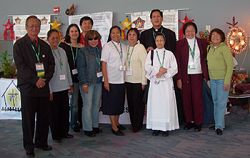Bishop Solis embodies bridge-building among groups, ethnic ministers in Los Angeles say
Friday, Feb. 03, 2017

Courtesy photo
+ Enlarge
Bishop Solis poses with members of the Archdiocese of Los Angeles' Filipino community in front of their exhibit at the 2009 Religious Education Conference.
Editor’s note: The Most Rev. Oscar A. Solis will be installed as the 10th Bishop of Salt Lake City on March 7. This is one in a series of articles about him.
Intermountain Catholic
SALT LAKE CITY — Bishop Oscar A. Solis made national history on Feb. 10, 2004 when he became the first Filipino-American bishop ordained in the United States. With his new status of bishop came new responsibilities, as he was assigned to be Vicar of the Archdiocese of Los Angeles’ Office of Ethnic Ministry, a position he held until 2009.
There was hardly a soul that the bishop did not touch in the Office of Ethnic Ministry, said Marija Newsom, who was a volunteer on the OEM’s Board of Directors during Bishop Solis’ time as vicar. “He was a wonderful leader,” she said. “He was well-regarded. … No, not just well-regarded, but beloved.”
The OEM’s goal was to build a ministry to serve all of the ethnic communities and to build bridges between the different groups, said Michael Lau, who served a term as president of the OEM’s Board of Directors under Bishop Solis’ administration.
Lau and Newsom agreed that Bishop Solis embodied this goal.
“What impressed me most about [Bishop Solis] was how he thought every ethnic community is important, regardless of its size,” Newsom said. “He respected every single ethnic group and he attended almost every event each one had. ... As vicar of OEM, he revitalized that whole ministry.”
The influence of the work that Bishop Solis did with the OEM can still be seen and felt in the Archdiocese of Los Angeles. For example, shortly after Bishop Solis became vicar, contention arose about the OEM’s annual “Migration Day” event, which was meant to celebrate various cultural traditions of migrants to the United States.
However, Migration Day wasn’t all-inclusive. Lola Loudd, an OEM chairperson and representative of the African American community in the Archdiocese of Los Angeles, summed it up plainly: “I’m not an immigrant,” she said.
Other ethnic communities, like the American Indians, also were not migrants and were not acknowledged by the name of the celebration.
When the controversy first arose, Loudd remembered thinking, “OK, we’re gonna have to go home and pray about this.”
The answer to those prayers came when the issue was brought to the attention of Bishop Solis, who suggested that the event name be changed to the more inclusive “Celebration of Culture.”
The renamed event has official recognition from the Archdiocese of Los Angeles and continues to be held every year.
“Bishop Solis was always very sensitive to everyone’s needs,” Loudd said.
Although the changes he made were important, it was Bishop Solis’ kind heart and loving nature that made him so well loved in the Archdiocese of Los Angeles, said his personal secretary, Lupe Garrido.
“It was like going to Disneyland every day, he was so fun to work for,” Garrido said.
“He knows exactly what he needs to do,” Lau said. “He’s a very intelligent man and very easy to work with. He listens to people.”
“He’s been really supportive and gracious to us,” said Eva Walters, a representative of American Indians in the OEM. “If you ever had any problems, he’d be willing to listen and help however he could.”
The bishop’s sense of humor was appreciated, as well.
Butch Geraldez, who served as OEM treasurer and vice president, said that one of Bishop Solis’ favorite ways to greet people is to say in Tagalog, “hindi naman ako hihingi ng donasyon.” Roughly translated, this means “don’t be afraid to approach me because I’m not asking for a donation.”
Lau remembered a time when Bishop Solis’ lighthearted nature shone through: The bishop frequently told the OEM members that they needed to work together and should not always only listen to what he as the bishop was telling them. “So once, while we were working, Bishop Solis was telling me to do this and that, and I said, ‘Bishop, you’ve got to stop micromanaging us.’ Then I thought, ‘Shoot, I shouldn’t have said that.’ But Bishop Solis just said, ‘Michael, you’re absolutely right,’” Lau said, adding that Bishop Solis wasn’t afraid to take his own advice ahead of his pride.
Saying goodbye to Bishop Solis is difficult, Newsom said. “We’ll miss him terribly.”
But, everyone is excited for him too, Garrido said. “[The Diocese of Salt Lake City] is so fortunate, so blessed,” she said. “I pray for Bishop Solis. I pray that the people of Salt Lake City will accept him as their new bishop. The people of Salt Lake City are going to receive the gift of working with Bishop Solis. He’s a huge blessing from God.”
For questions, comments or to report inaccuracies on the website, please CLICK HERE.
© Copyright 2024 The Diocese of Salt Lake City. All rights reserved.
© Copyright 2024 The Diocese of Salt Lake City. All rights reserved.

Stay Connected With Us